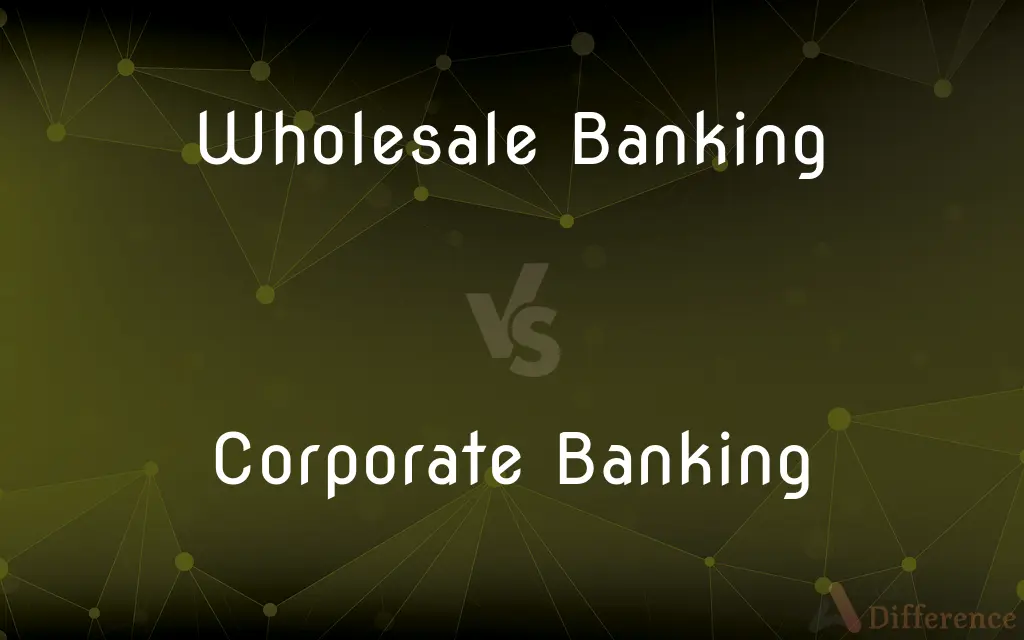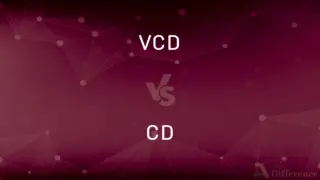Wholesale Banking vs. Corporate Banking — What's the Difference?
By Tayyaba Rehman — Published on October 21, 2023
Wholesale Banking offers services to other banks and large institutions, while Corporate Banking focuses on providing services to businesses.

Difference Between Wholesale Banking and Corporate Banking
Table of Contents
ADVERTISEMENT
Key Differences
Wholesale Banking and Corporate Banking are distinct divisions within the banking industry, tailored to specific clientele. Wholesale Banking predominantly caters to other financial institutions, large corporations, and the government. On the other hand, Corporate Banking deals directly with businesses, both large and small.
The spectrum of services in Wholesale Banking is broad. It encompasses everything from asset management, underwriting, merger advisories, to trading services. In contrast, Corporate Banking offers more standardized services such as business loans, credit, and treasury and cash management services.
Wholesale Banking usually involves high-value transactions given the nature of its clients. It's a segment that requires global outreach due to the vastness of institutions it serves. In the realm of Corporate Banking, relationships are built on trust, with banks often offering customized solutions to meet individual business needs.
While both Wholesale and Corporate Banking play crucial roles in the economy, their risk profiles differ. Wholesale Banking might encounter risks associated with global economic changes, while Corporate Banking might deal with risks tied to business cycles of specific industries.
To encapsulate, while Wholesale Banking dives into extensive financial services for large entities, Corporate Banking zeroes in on serving the day-to-day financial needs of businesses.
ADVERTISEMENT
Comparison Chart
Primary Clients
Financial institutions, large corporations, governments.
Businesses of all sizes.
Service Spectrum
Broad (from underwriting to trading services).
Standardized (like loans, credit, treasury services).
Transaction Value
Generally high-value transactions.
Varied, depending on business size.
Outreach
Often global.
Mostly localized or regional.
Risk Profile
Global economic changes, inter-bank relations.
Business cycles, specific industry risks.
Compare with Definitions
Wholesale Banking
Handles complex, large-scale financial needs.
For their massive infrastructure project, they approached the Wholesale Banking division.
Corporate Banking
Builds long-term relationships with businesses.
The family-owned enterprise has been with their Corporate Banking partner for decades.
Wholesale Banking
Involves high-value transactions and services.
The merger deal was facilitated through the Wholesale Banking division.
Corporate Banking
Banking services tailored for businesses.
The startup availed a business loan through Corporate Banking.
Wholesale Banking
Offers a diverse range of financial services.
Asset management is a key offering of Wholesale Banking.
Corporate Banking
Focuses on daily business financial needs.
The manufacturing unit used Corporate Banking for its payroll services.
Wholesale Banking
Caters to a global clientele including governments.
International trade services are a big part of Wholesale Banking.
Corporate Banking
Provides business loans, credits, and other financial products.
With the help of Corporate Banking, the company expanded its credit line.
Wholesale Banking
Banking services for financial institutions and large entities.
Through Wholesale Banking, the national bank provided funds to smaller regional banks.
Corporate Banking
Offers specialized solutions based on business size and type.
The restaurant chain availed a tailored financial solution from their Corporate Banking division.
Common Curiosities
How does Corporate Banking support small businesses?
Corporate Banking provides financial products, loans, and advisory services tailored for small businesses.
Is Wholesale Banking the same as investment banking?
No, while Wholesale Banking can include investment services, they are distinct fields.
Who are the main clients of Wholesale Banking?
Wholesale Banking mainly serves financial institutions, large corporations, and governments.
What kind of customized solutions can Corporate Banking provide?
Corporate Banking offers solutions like specialized credit terms, treasury services, and more tailored to individual business needs.
Are the transactions in Wholesale Banking of higher value than in Corporate Banking?
Generally, Wholesale Banking involves higher value transactions due to its large-scale clients.
Can a startup avail services from Corporate Banking?
Yes, startups can avail various services from Corporate Banking to support their growth.
Is asset management a part of Wholesale Banking?
Yes, asset management can be a service under Wholesale Banking.
What services can a business expect from Corporate Banking?
Corporate Banking offers business loans, credit, treasury services, and more.
Can a local business avail services from Corporate Banking?
Yes, Corporate Banking serves both local and larger businesses.
How do Wholesale Banking and Corporate Banking differ in risk management?
Wholesale Banking manages global economic and inter-bank risks, while Corporate Banking handles risks tied to specific business industries.
Do both Wholesale and Corporate Banking operate internationally?
While Wholesale Banking often has a global outreach, Corporate Banking is usually more localized or regional.
Is treasury and cash management a part of Corporate Banking?
Yes, treasury and cash management are essential services offered by Corporate Banking.
Which type of banking is more prone to global economic changes?
Wholesale Banking is more susceptible to global economic changes given its wide reach and client base.
How do businesses benefit from Corporate Banking?
Businesses can access financial products, advisory services, and tailored solutions through Corporate Banking.
Are the services in Wholesale Banking more diversified than in Corporate Banking?
Wholesale Banking generally offers a broader range of services due to its diverse clientele.
Share Your Discovery

Previous Comparison
Physical Map vs. Political Map
Next Comparison
VCD vs. CDAuthor Spotlight
Written by
Tayyaba RehmanTayyaba Rehman is a distinguished writer, currently serving as a primary contributor to askdifference.com. As a researcher in semantics and etymology, Tayyaba's passion for the complexity of languages and their distinctions has found a perfect home on the platform. Tayyaba delves into the intricacies of language, distinguishing between commonly confused words and phrases, thereby providing clarity for readers worldwide.














































